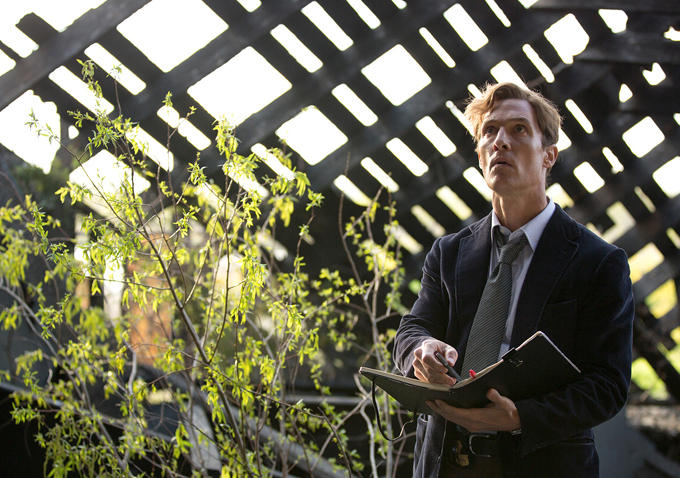
“You’re looking for narrative, [you] interrogate witnesses, personal evidence, establish a timeline, build a story, day after day…” the weary Martin Hart (Woody Harrelson) lays bare about his job. That’s right, we’re only in the second episode of “True Detective,” and already the grind of the work comes to bear on both Hart and Rust Cohle (Matthew McConaughey). And for the pair, the routine of police work is the source of pain and salvation…sometimes both.
For Martin, perceived as the more cool and collected of the duo, his main concern is ensuring that he can wipe away the traumas he sees in any given day on the job, before he goes home to his wife and kids. “You gotta decompress before you can go being a family man,” he explains to the investigators in the 2012 timeline. “What you get into working, you can’t have the kids around that. So sometimes you have to get your head right. You gotta take your release where you can find it, or where it finds you. I mean, in the end, it’s for the good of the family.”

Such is Martin’s rather dubious rationalization for carrying on an affair with Lisa (Alexandra Daddario), a much younger, curvier and sexually rapacious creature than his wife, Maggie (Michelle Monaghan). But is Martin really cleansing himself or cowardly avoiding the problems he has at home? Maybe a bit of both, but certainly, from what we see of his minimal presence with his wife and daughters, he’s not keeping the realities of the job hidden far enough from those he loves. Maggie is angered by the amount of time he spends out of the house, and while his young children are affectionate, a quick look at their dolls posed, in a garish recreation of a crime scene, suggests they’ve glimpsed the darkness Martin deals with.
But his domestic problems pale in comparison to his partner, Rust. Much of “Seeing Things” centers on filling in his mysterious past, and it’s mired in extremes of emotional turmoil and destructive behavior. We learn his daughter Sophie was hit by a car and entered a coma before passing away, and his marriage to Claire couldn’t survive that loss (she eventually left him). Rust did the only thing he knew how to do, and got lost in his work. Transferring from robbery to narcotics, he was soon on the clock 24/7, before he unloaded a gun at a junkie who injected his infant daughter with crystal meth. His wife left, and Rust went deeper undercover, working for whatever agency needed intel, spending four years as part of the High Intensity Drug Trafficking Area force, mired in the drug world.

Seeing the basest behavior in people made Rust philosophical about his own kid passing away. He now believes it’s “hubris” to bring a soul into this world, and that Sophie’s death, “Spared me the sin of being a father.” But eventually it all crashed down around him, and he wound up in the North Shore Psychiatric Hospital where he was facing being released on a disability pension. But calling in a few favors, we was transferred to Louisiana, where he now finds himself working with Martin in homicide.
But the lingering effects of his harrowing days in the drug game, still have a lasting touch. Rust admits he suffered from PTSD, nightmares and shattered nerves, but worst of all, he has chemical flashbacks that can occur anytime. (Though, now relatively sober, Rust says those visions have left him). They are trippy hazes of light, or as we see at the end of the episode, a prophetic group of birds in the sky, suddenly swirling into formation, mirroring the shape of the eerie tattoo found on Dora Lange. But Rust claims he knew the difference between reality and brain addled delusion. Mostly. “Back then, the visions, most of the time I was convinced I’d lost it. There are other times, I thought I was mainlining the secret truth to the universe.”

The truth to the universe of not, there’s still a case to look into, as in a nice parallel to Martin’s description of the job, most of “Seeing Things” finds the pair knocking on doors and talking to people, trying to find a line on Dora Lange, and who she might have been with before she died. And the pressure to solve the murder is intensified when Martin and Rust are informed a task force is being convened to take over the case. But, as the episode closes, they get a break: a former revivalist church where Dora used to attend is found, with the imagery of antlers painted on the wall, with those aforementioned birds swooping in the sky as reality and fantasy collide again for Rust.
But, if there’s one telling quote that sums up the episode, it’s what Rust says to a prostitute from whom he’s buying pills and getting information from: “I’m the police. I can do terrible things to people with impunity.” It’s a piece of dialogue that’s arguably more ominous that any hallucinations or grisly crime scene; it hints that the darkness these men encounter is one that creates a unhealthy awareness of their own limits of moral character. Whether they can resist it, will be the question. [B+]

